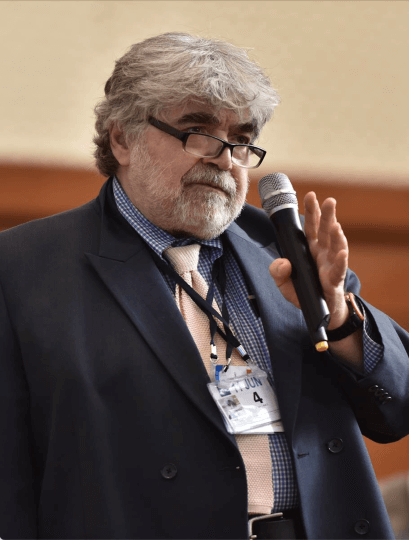Russell deLucia, S.M. '64, Ph.D. '69
Russell deLucia believes social impact and environmental sustainability go hand in hand. It’s a philosophy he’s carried for more than 50 years, dating back to his time as a Ph.D. candidate at Harvard. He arrived to study engineering at the Harvard John A. Paulson School of Engineering and Applied Sciences (SEAS), where his advisor Harold Thomas, Gordon McKay Professor of Civil and Sanitary Engineering, wanted him to also study economics as part of the cross-disciplinary Harvard Water Program. Later while still finishing his Ph.D. he joined his advisor and others in the Program to found the consulting firm Meta Systems Inc, which conducted water-resource and other environmental studies.
Very early in his time at Meta Systems, deLucia also traveled to the Sahel region of Africa with Professor Roger Revelle, founder of the Harvard Center for Population Studies. The region was in the midst of a drought and famine, and deLucia’s experience crystallized in the connections between environmental change and human suffering.
“I came to face poverty in a way I’d never seen before in my life, and I saw that all the skill sets and training of the land and water resources had come to bear,” deLucia said. “There was no looking back after that.”
DeLucia, S.M. ‘64, Ph.D. ‘69, has devoted the last half-century to potential interventions that can encourage sustainability efforts and make life better for the most marginalized people. He co-founded the NGO: Small-Scale Sustainable Infrastructure Development Fund (S3IDF) in 2001, which has helped invest in a number of local Indian companies focused on a range of sustainability efforts. Prior to that, he co-founded another consulting firm that specialized in energy, water and other resource and infrastructure issues in more than 60 nations in the developing world. He’s also consulted for global organizations such as the Asian Development Bank, World Bank Group, Inter-American Development Bank, International Fund for Agricultural Development, and the United Nations Food and Agricultural Organization.
“If you can improve the system and do it in a way that’s at least modestly commercially viable, you can achieve both poverty alleviation and environmental benefit,” deLucia said.
A Connecticut native, deLucia arrived at Harvard with an undergraduate degree in civil and environmental engineering from Manhattan College. The launch of Sputnik in 1957 caused an increase in funding for technical and engineering education in the U.S. through the National Defense Education Act, which reduced the cost of deLucia’s graduate education.
Harvard taught deLucia to always approach challenges through multiple lenses. Unless an engineering intervention takes economic impact into account and vice versa, disparities and pain points will endure.
“Years ago, when you did a rural electrification project, you didn’t link it to microfinance,” he said. “So, when you went into a village, the people who had the money to pay for the connections to the utility and do the wiring in their house benefited from it and the poor people didn’t. You think you’re doing a rural electrification project to help the poor, but you’re almost effectively anti-poor. You’re spending development money, and the benefits are largely going to the better-off. That’s how the concept of S3IDF came to be.”
Currently, S3IDF and deLucia, the organization’s angel investor, is especially focused on waste and sanitation in India. They hope to improve it via circular economy practices, using investees whose operations produce positive and measurable environmental and poverty alleviation impacts. While sanitation and waste workers in the U.S. are often unionized or otherwise earn livable salaries, the same often isn’t the case in India and other lower-resource nations.
“In every developing country that I’ve worked in, marginalized people maintain that waste stream,” said deLucia. “All of those people in the developing world are marginalized, unskilled, untrained, working for almost nothing, and not always getting the highest value out of that waste.”
The value of that waste is where circular economy practices S3IDF and deLucia’s impact-first investing approach comes in. They’ve partnered with local businesses through what deLucia calls a “social merchant bank approach,” in which technology, financing and know-how combine to open up new financing, education and business opportunities in poorer communities that often struggle with access to those resources. Specific examples of this Initiative include keeping plastic out of the ocean; harvesting invasive water hyacinth groves, which can then be turned into fiber and woven into bags or yoga mats for sale; training operators for machines to clean and remove septic blockages in sewers; converting human waste into compost to regenerate soil and improve access to chemical-free food; and using human waste serving as feeds for black soldier fly production, which can then be further converted to animal feed.
“If you don’t intercept that waste stream and do something with it, it starts decomposing anaerobically, which produces methane,” he said. “We know that short-lived pollutants like methane should be avoided as they are much more negative in their impact than cardon dioxide.”
The challenge for deLucia now is to continue to scale up his and S3IDF’s efforts, to create much larger economic and environmental changes than previously possible. That will take more connections in the developing world, but it will also take more people joining the company with a passion for this work. deLucia developed that passion at Harvard and knows SEAS is still turning out students just as passionate about using engineering to address global challenges.
“I view my life as very much influenced by the ecosystem of Harvard, and in particular the ecosystem of inter-faculty work,” he said. “One of the things I hope comes from this is that I get a chance to talk to students, because I love talking to students and trying to influence young people. The mentors in my life have impacted me enormously, and I feel it’s my job to pass that on.”
Press Contact
Matt Goisman | mgoisman@g.harvard.edu
